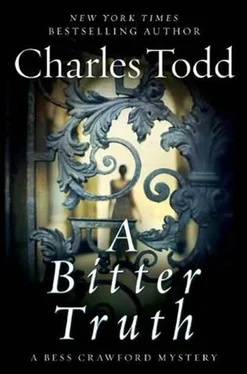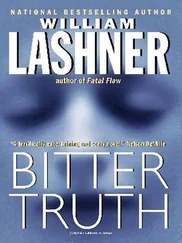It was a very persuasive argument. But Roger Ellis had lied to his mother. I knew that shell shock didn’t work like that. What’s more, George Hughes had told me chapter and verse exactly what he’d discovered about this child. And it hadn’t sounded like an obsession to me. Yes, he might have seen what he wanted to see. We all do that. But if she was Roger Ellis’s child, the resemblance could well have been more than passing.
We stood for a moment at Juliana’s grave. Just beyond it was Alan’s stone, achingly new.
“I thought he’d be here,” Mrs. Ellis said, looking around her as if she’d misplaced the Lieutenant. “He comes here nearly as often as I do. Well. Perhaps we ought to look in the church. It shouldn’t take long. There’s still more than enough time.”
As she led the way to the massive west door, I heard Lydia’s voice, pitched to carry. “Is he there? Mama? We need to hurry.”
The door was slightly ajar. Mrs. Ellis took a deep breath as she put her hands on the thick wooden panels. I helped to push the door wider, and we crossed the threshold side by side.
The interior felt-quite literally-as cold as the grave, and it was quite gloomy as well, despite the early attempts of the sun to break through. The stained glass on either side of the aisle and above the altar had no life, although it must have been quite glorious on a sunny day.
I couldn’t imagine sitting here for any length of time, cold as it was. And at first glance the church appeared to be empty. It felt empty as well.
“George?” Mrs. Ellis called, her voice echoing around the walls, so that it sounded rather like “Geo-orge-orge.”
Six slender pillars divided the nave, creating two narrow aisles on either side, memorials lining the walls between the windows. Before the altar was a delicate stone rood screen, setting off the choir. The pulpit was also stone, with worn steps leading up one side.
She called again, but there was no answer.
“I don’t think he’s here,” I said. “But shall I walk as far as the altar, to be certain?”
“Yes, if you would, my dear.” Mrs. Ellis’s voice sounded hollow. Her face seemed pinched, uncertain.
I walked away, listening to my heels echo on the stone paving, glancing right and left as I went. But there was no one here. I reached the rood screen, paused, and then went into the choir. It too was empty, the east window behind the altar rising above me and reminding me of the oriel window above the door at Vixen Hill.
Behind me, I heard Mrs. Ellis say, “I’ll just have a look in the organ loft.” I turned and walked back along the opposite aisle, meeting her as she came down the stairs.
“I was so sure,” she said distractedly, “that we’d find him here. It was almost a premonition.”
“He went for a walk, after all,” I reassured her. “He may have been here and moved on.”
We went through the west door again, letting it swing shut behind us. It made a great booming sound like the gates of hell closing.
Both of us winced.
We walked right around the church, but there was still no sign of George, and I was glad to come back again to the wrought iron gate where we had entered. The empty, quiet, isolated church seemed almost to be glad to be rid of us as we went to leave. I looked again at the lovely little marble statue of the kneeling child, and marveled at how well Juliana’s features and smile had been captured in stone.
Small wonder George Hughes had been captivated by the child with the nuns, and why he wanted so desperately to have her be Roger Ellis’s daughter. But was she?
“Someone’s moved the kitten,” Mrs. Ellis said, and she stopped to set it just within reach of Juliana’s marble fingers. “I expect it was George. There.”
As we walked out of the churchyard and shut the small gate behind us, Lydia said, “He wasn’t there? I could have told you-a wild-goose chase. Mama, if you hurry, there will just be time to take you back to Vixen Hill.”
“I just want to walk a short way down the path. Roger and George used to play here sometimes. You must remember the little stream they were always talking about. I won’t go any farther than that.”
And without waiting for an answer, she started down the overgrown path, almost like a tunnel through the winter dead grasses leading to the unseen stream. I went with her, shutting out Lydia’s protests. In gratitude, Mrs. Ellis turned and smiled at me over her shoulder.
Someone had been here before us. Even I could see that much. A deer, perhaps, if there were any left here in the Forest, or a ewe looking to drink from the stream. There were only a few bent stalks of grass here and there, and it was impossible to tell how recent it might have been.
The path turned, turned again, and then the stream lay below us, half hidden in grasses along the bank, many of them bent double with the weight of ice as the water splashed over them.
We saw his feet first, encased in his Army boots. And then his legs. One more step brought us to a sloping overlook, and from there we couldn’t miss the rest of him sprawled across the bottom of the path, his face and shoulders in the clear, cold water, his dark hair moving gently with the current, his greatcoat wet across the back from the fitful eddying of the stream over its rocky bed.
Had he killed himself, after all? Not across Juliana’s grave, as I’d feared, but here in this quiet place where the only sound was the water spilling over rocks.
But where was his service revolver?
Mrs. Ellis gave a little cry of shock and despair, and stopped where she was, one hand outstretched, as if to comfort him somehow.
I moved around her and went down to touch the hand that lay on the marshy bank of the little stream. There was no need to feel for a pulse. George Hughes was quite dead and had been for hours. But how had he died?
We missed our train after all, Lydia and I.
Although I’d wanted to stay with the body, Mrs. Ellis wouldn’t hear of it. We went back up the path, telling Lydia what we’d found.
And then the carriage took us back to the house. Roger Ellis went alone into Hartfield to bring the police.
We sat, the rest of us, in the hall, cold in spite of the fire, not knowing what to say to one another. I had let Mrs. Ellis explain what we’d found at the bottom of the path. Meanwhile, Lydia, her arms wrapped around herself for comfort, huddled in a chair to one side. I could see the effort it was taking to hold back her tears. Not for the dead man, I thought, but for her own thwarted plans.
If we’d gone directly to the station, we’d have been well on our way to London now.
It was not long before Roger Ellis returned with the local constable, Dr. Tilton, and the rector, Mr. Smyth.
To spare Mrs. Ellis, I went with them back to Wych Gate Church. I led the way down the path a second time, knowing now what was at the bottom of it, and stepped aside at the last minute so that the constable, a man named Austin, could see what Mrs. Ellis and I had seen less than an hour earlier. Roger Ellis, the doctor, and the rector had been asked to stay with the motorcar at the top of the path.
Constable Austin, square and competent, said, halting on the path, “You’re quite sure he’s dead?”
“Quite,” I said.
“And all you touched when you went nearer was his hand, looking for signs of life?” He’d already asked me that on our way to Wych Gate. But I knew he had to be sure.
“Yes, that’s right. I was careful not to disturb the body any more than necessary. You can see my tracks just there. If he’d been alive, I’d have pulled him out of the water. But there was nothing I could do.”
Читать дальше












